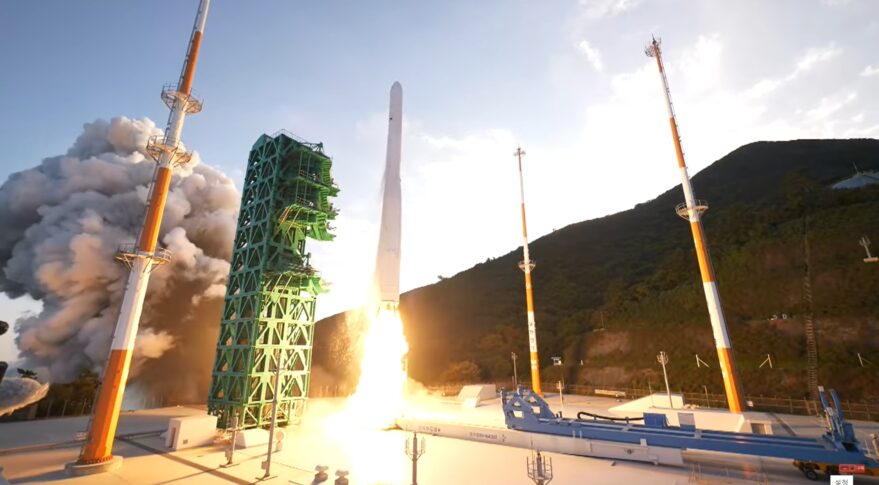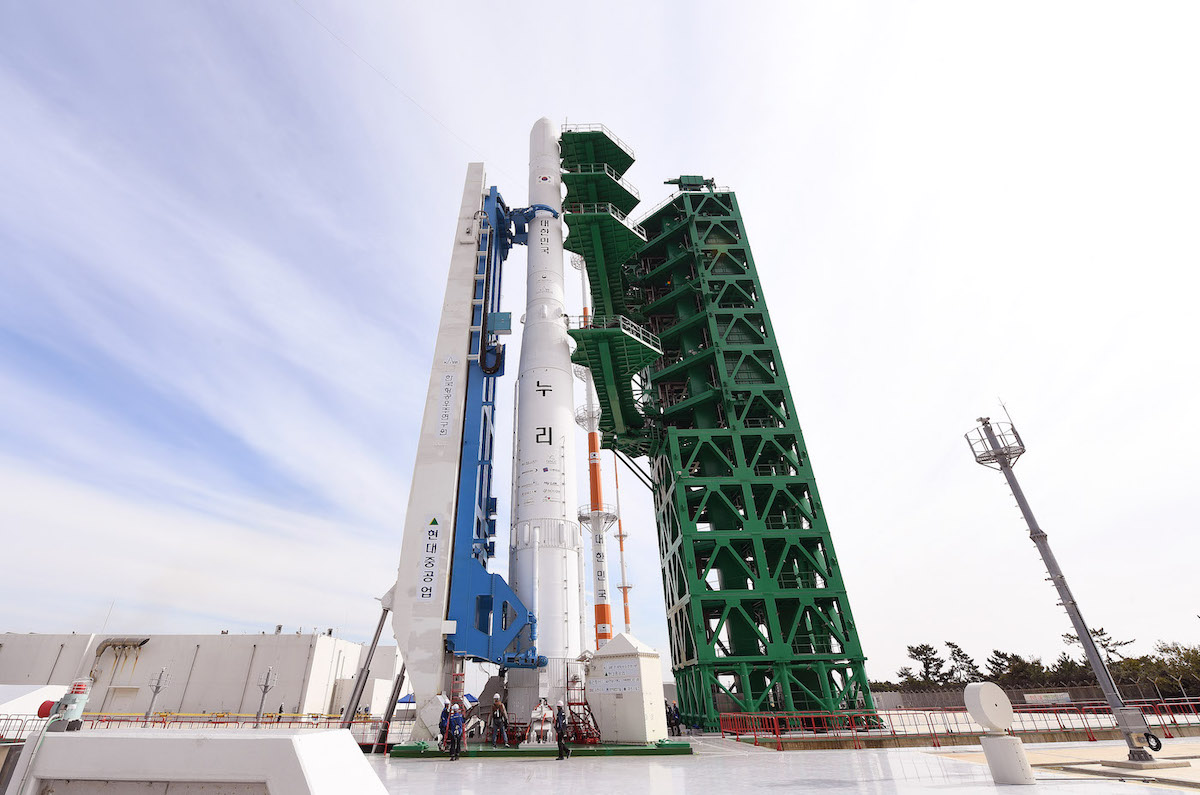Pierwszy start koreańskiej rakiety nieudany 21.10. o 08:00 z południowokoreańskiego kosmodromu Naro wystrzelony został pierwszy egzemplarz RN Nuri (KSLV-2), która miała wynieść w T+13' 21" na orbitę o parametrach: hp=700 km, ha=700 km, i=97° makietę satelity.
Start zakończył się niepowodzeniem, prawdopodobnie na etapie pracy trzeciego stopnia, który nie osiągnął prędkości orbitalnej, zabrakło do niej ok. 800 m/s. Przyczyną było przedwczesnym zakończeniu pracy jego silnika, w T+475 sekund, zamiast w T+521 sekund. Niedoszły satelita osiągnął wysokość maksymalną ok 740 km i spłonął w atmosferze na południe od Australii około 30 minut po starcie.http://lk.astronautilus.pl/n211016.htm#03South Korea launches first space rocket but fails to fully place a dummy satellite into orbit3664 wyświetlenia 22 paź 2021
Nieudany debiut Nuri (KSLV-II) BY KRZYSZTOF KANAWKA ON 22 PAŹDZIERNIKA 2021
(...) Następnie, przez kolejne kilkadziesiąt minut oficjalne źródła południowokoreańskie nie przekazywały żadnych informacji. Wreszcie, tuż przed 12:00 CEST prezydent Korei Południowej poinformował, że ten start zakończył się “pół-sukcesem”. (...)
https://kosmonauta.net/2021/10/nieudany-debiut-nuri-kslv-ii/https://www.space24.pl/wiadomosci/korea-pld-debiut-rakiety-nosnej-nuri-bez-udanego-zwienczeniaSouth Korea’s 1st homegrown space rocket reaches space but fails to orbit dummy payload by Park Si-soo — October 21, 2021 This story was updated 11:15 EDT with additional information.
 KSLV-2 blasts off from the launchpad at Naro Space Center in Goheung, Oct. 21. Credit: Korea Aerospace Research Institute
KSLV-2 blasts off from the launchpad at Naro Space Center in Goheung, Oct. 21. Credit: Korea Aerospace Research InstituteSEOUL, South Korea — South Korea’s first domestically built rocket reached its intended altitude in its maiden flight Oct. 21, but its third-stage engine shut down 46 seconds early, releasing its 1,500-kilogram dummy payload at less than orbital speed.
The dummy payload is expected to fall back to Earth south of Australia, but the Korean Aerospace Research Institute (KARI) did not immediately provide a timeline for the reentry.
“The flight of Nuri was completed. I’m very proud of this. Regrettably, it didn’t reach the goal it aimed at,” President Moon Jae-in announced at Naro Space Center in Goheung, where the kerosene-fueled, three-stage KSLV-2, also known as Nuri, lifted off at 4 a.m. Eastern, carrying a 1.5-ton dummy payload. “Shooting a rocket to the height of 700 kilometers itself is a great achievement. We are one step closer to outer space.” (...)
https://spacenews.com/south-koreas-1st-homegrown-space-rocket-reaches-space-but-fails-to-orbit-dummy-payload/South Korean satellite launcher set for first test flightOctober 20, 2021 Stephen Clark
 South Korea’s Nuri rocket on its launch pad Wednesday at the Naro Space Center. Credit: KARI
South Korea’s Nuri rocket on its launch pad Wednesday at the Naro Space Center. Credit: KARI(...) Before liftoff, the South Korean launch team will load kerosene and liquid oxygen propellants into all three stages of the Nuri rocket.
Four KRE-075 engines, developed by the South Korean company Hanwha Aerospace, will flash to life in the final moments of the countdown. The liquid-fueled engines will power up to full throttle, generating 586,000 pounds of thrust to push the launcher into the sky.
The rocket’s KRE-075 engines each use a gas generator to drive a pump feeding propellant into the thrust chamber. SpaceX’s Merlin engine, which power the Falcon 9 rocket, use a similar design. (...)
https://spaceflightnow.com/2021/10/20/south-korean-satellite-launcher-set-for-first-test-flight/South Korean rocket fails to reach orbit on inaugural test flightOctober 21, 2021 Stephen Clark
(...) Two minutes after launch, the first stage’s four engines shut down. The booster jettisoned moments later, and a single KRE-075 engine on the Nuri’s second stage ignited to continue the climb into space. The live video continued tracking the rocket into the second stage burn.
The rocket’s payload fairing, or nose cone, jettisoned as planned nearly four minutes into the flight, officials said. And the rocket’s third stage, powered by a smaller KRE-007 engine, ignited to accelerate to an orbital velocity near 17,000 mph, or about 7.5 kilometers per second.
But the liquid-fueled third stage engine shut down prematurely, leaving the rocket short of orbital velocity, according to the Korea Aerospace Research Institute, which managed development of the Nuri rocket. (...)
https://spaceflightnow.com/2021/10/21/south-korean-rocket-fails-to-reach-orbit-on-inaugural-test-flight/https://www.nasaspaceflight.com/2021/10/kslv-nuri-maiden-launch/https://space.skyrocket.de/doc_sdat/nuri-test-payload.htm